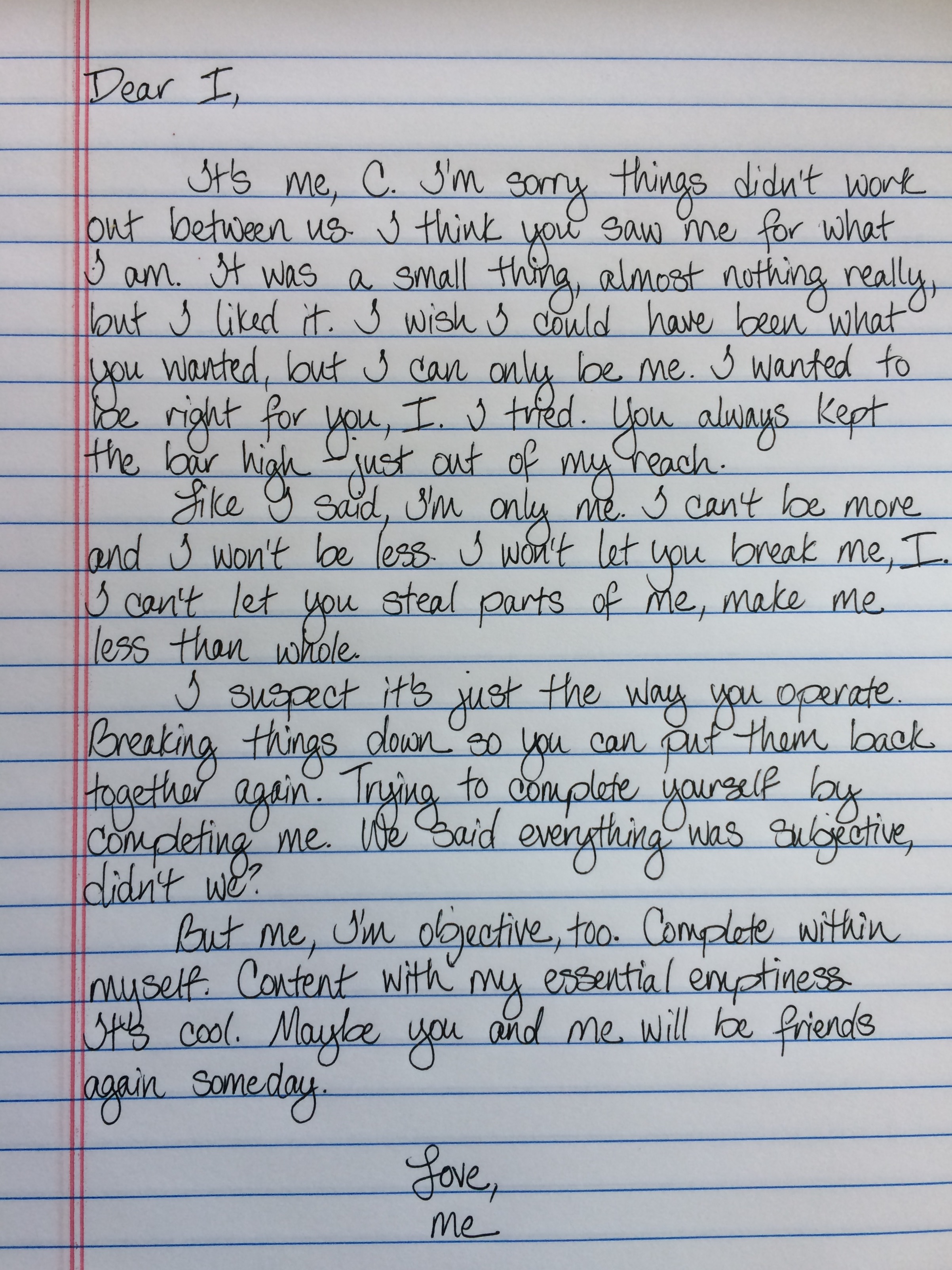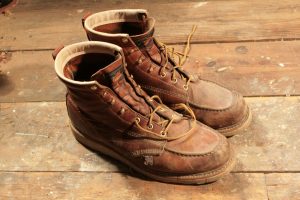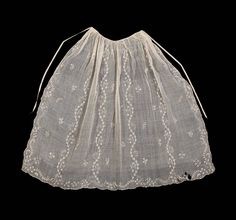A meta-subjective love letter, inspired by Chris Kraus’Â I Love Dick. Enjoy!

A meta-subjective love letter, inspired by Chris Kraus’Â I Love Dick. Enjoy!

Cain has a fondness for Mondays. His eggs arrive on Monday, delivered to his door by a farmer on his way to town. On any given Monday, he receives two dozen fertilized eggs, sometimes as many as three. He welcomes his eggs, greets them warmly, carries them to the cellar door and locks it behind him. Cain’s wife and daughter chalk the egg keeping up to a new hobby; he’s always been sort of an all-rounder. They permit him his eccentricities, as well as full use of the cellar. For this he is grateful. A man needs his space.
He keeps his eggs in an incubator he’s fashioned himself from a clear plastic bin, foam, and an electric warmer, soft overhead lights, real incandescent, not the horrid LCD lighting so popular these days. Cain is generous with his new eggs. By their side in his armchair, he reads to them from his books, tells them jokes. Buoys them through the day-to-day of their becoming. He keeps it lighthearted, all the best to cull their burgeoning spirits. He wants only to please his new darlings. When dusk falls, he pets each one on its lovely ecru apex with his index finger before shutting off the light and heading up to bed.
Tuesday mornings bright and early he checks his babies for cracks. Often he must wait until Wednesday for the first. Oh! He finds a single hairline fracture, a hesitant gap just beginning, and he smiles. Cain’s smile is large, momentous. This can be the hardest stretch, the interminable hours of Tuesday, Wednesday’s early anxiety, through which he perseveres in his armchair in the gloom, waiting and watching for the fissures he knows will form. There may be three or four by the time he turns in Tuesday evening, wishing for dawn, for openings.
Wednesdays are busy days. Cain wakes at the first gray light, peering over his half-born babies, and he finds them disheveled. Fissures have given way to chasms, and he hazards another grin. He’s happy now that hatch day is here. He prepares the cage, gives it one last preparatory wipe, and fills it with soft straw for his newborn chicks. He watches over the eggs closely, not wanting to interfere – nature knows best, and he knows better than to rush his hatchlings. Cain’s hot breath fogs the incubator and he wipes that too, settles into his armchair to watch the rest of the birthing process. He clucks to them, his chicklings, as he finds ways to busy his hands.
By lunchtime they’re all born, all downy warm yellowy feathers and teensy sharp beaks. Better than the birth of his own human daughter since they’re all his. Cain doesn’t dare touch one, not yet. Instead he sits forward on the edge of his seat and strains to hear their first soft cheeps. He washes and rewashes his hands in the basin under the stairs so he’ll be ready when they are.
At dinnertime they’re chirping for real, and he knows what to do. He lifts each baby chick from the incubator by its small hot body and moves it gingerly to the cage, sets it inside. A whole new world! Twenty-four darlings, twenty-four wondrous looks. Cain sends his wife to bed and stays up late admiring his chicks. He offers water and seed, reads aloud from his books, offering a chirp now and then. Wednesdays he goes to bed happy, crawls under the covers heart full and hopeful. He looks forward to the day ahead, more of the same, enjoying his babies, watching them grow.
Thursday he spends cleaning out the incubator, readying it for next week’s new batch. Cain sings as he works, simple love songs composed of clicks, clucks, and coos. Only his lovelies can hear; he’s got the cellar door soundproofed. He watches over them to ensure they all get along, no pecking fights, nothing ugly. He likes his chicks peaceful. All together.
Friday morning, Cain cleans his boots, slung back low in his armchair. Atonement. He hums to his chickies as he scrapes out the treads with his penknife. He gives his boots a thick coat of polish and rubs them with a cloth until they gleam. He sets them on the shelf next to the cage, to expose his babies, to help them feel comfortable with his boots. This takes some time. Cain doesn’t like to inflict fear and he takes pains to avoid it.
After he’s put everything in its place, he watches over the chicks until evening falls. Friday night. His favorite time. Only then does he double check the lock at the top of the cellar steps, does he unbutton his shirt, does he permit himself to play with one of them, just one. The very best of the batch. Cain takes the smallest, fluffiest chickling from its enclosure, rubs its downy feathers on his face. He inhales its musty scent, brushes its small body against his lips. Again and again, he never tires of this. He sits back in his armchair, lays the chick on his clean-shaven chest, lets her peck him. He’s been waiting for this all week. His sine qua non. The sensations build slowly, now soft, then sharp, soft again. So soft. Soon he’s quaking and panting under her small perfect body. He feels his faults arising, presses his face down into the helpless not so helpless puck of down on his chest and feels the emission escape him, a sweet hot long release. At last. Oh, Friday is a good day.
He holds her a long time afterward, only returning her to her sisters long past midnight has rendered its blissful obscurity. He retires to his marriage bed, sleeps in Saturday. Late in the day he descends to feed his girls. He reads them a bit more from his collection. He kneels, says a quiet prayer. Then Cain rises, takes his shining boots from the shelf, slips them on, does up the laces. He’s ready now. The yang to last night’s yin.
Cain surveys his chickies, finds his prettiest, and sets her to the side. The best for last. He takes another, a bright yellow one, and lifts her out. This one he doesn’t press to his face. He sets her down firmly on the ground, on a square of plywood he’s cut and fitted just for this purpose. She cheeps, his chickie. Pecks the wood. His movement is strong, fluid yet masculine. He lifts his thigh parallel to the ground, brings his heel down hard on her small defenseless body. He can feel the infinitesimal bulge under his boot. It’s all part of the ritual to Cain. He removes his foot, checks her corpse for signs of life, finds none. He returns to the cage, selects another girlie. She cheeps at him as if in rebuke, and he gives her body a tight squeeze before he sets her on the plywood.
Five chicks in, the cellar smells of blood and the others are cheeping to save themselves. He picks up the pace, wanting to get the dirty work over with. Saturdays are unsavory. A half-hour later the stench is overpowering and the room is silent save for Cain’s heavy breathing and one plaintive cheep. Hers. He peers into the cage, can’t take the way her eyes are glistening. Somehow today feels different than all the other Saturdays. He cannot crush her. He cheeps once to show her he’s not going to hurt her. He leaves his boots by their bodies and slinks off to bed, spent.
Sunday he wakes at dawn, slips away from his still snoring wife. In the cellar, amid the lonely sound of a single lovely chirp, he slips on the rubber gloves and tall galoshes he keeps just for this purpose. He kneels by the messy plywood and prays. Their brief lives, snuffed out. Too soon, he cries, weeping. She watches him from her cage. Then, reverently, he lifts the grisly remains of each of his lovelies into one of the wooden boxes he’s built. He closes the lid with a flutter of kisses. He washes the bloody plywood with hot water and lemon, props it to dry in one corner. His boots, he sets aside for later. A memento mori. He tidies his books and straightens his armchair. He wipes the incubator again, as well as the shelf, the floor. Finally, he cleans the cage, lifting his sole chick gently into his shirt pocket. He buries the box way out in the corner of the yard where his daughter never plays and spends the afternoon building an enclosure. As he works, she serenades him with a soft song of cheeps. By evening, all is ready for the week ahead.
When the farmer arrives Monday morning, Cain asks if he can purchase a rooster. “Sure thing,†the farmer agrees, cheerfully and unknowingly rendering himself out of the weekly equation. “I’ll bring him next Monday.†Cain flashes him the rare smirk he reserves for preserving social graces as he cautiously lifts the week’s fresh case of eggs. He frowns at his daughter waving to the farmer through the front window.

(Scene: A spare galley kitchen with a Viking range in the center beneath a large stainless steel hood vent. White lower cabinets, dark tiles above. No microwave. A set of tract lights overhead sends pinpoints of brightness into the gloom. Catty-corner to the kitchen stands a tall bar stool, and in it sits a woman wearing a little black dress and a pair of thick-rimmed glasses. She’s barefoot and reading a novel in Japanese. A glass of wine sits on the countertop next to her. At the counter next to the stove, facing away, is a man. He’s tall, thin, angular, but also delicate. He’s naked, save for a gauzy cotton eyelet half-apron, circa mid-eighteenth century, knotted around his waist. It was a gift from a previous lover. He’s preparing dinner, cooking an omelet. He’s cut up some tomatoes and they glisten in a bowl next to him. Now he’s chopping an onion, and every so often he wipes his eyes with his forearm. The woman seems engrossed in her book, but also exudes a sense of awareness, of watching over his movements.)
MAN
The children will be home–
WOMAN
We’ve still got some time.
MAN
(Wipes his eyes. The woman goes back to her book. He continues to chop the onion, methodically, thoughtfully. He sniffles loudly. The woman eyes him over her book. He crumples atop the cutting board, and the woman sets down her book.)
WOMAN
Are you crying?
MAN
(Sobs.)
WOMAN
(Kindly.) Come now. We’ve got enough time. You know there’s always long enough.
(She goes back to her book as he nods and wipes his face with his apron, exposing himself. He pours oil into a pan on the stove, sets the bottle on the counter. He picks up the knife and finishes with the onion, puts the chopped onion into a bowl, and rinses the knife under the faucet. He uses his apron to dry it. He holds up the knife and the light momentarily catches it, then he rubs it on his apron again as if to polish it. The woman gives him a slight smile over her book. He picks up a zucchini from the counter and rinses it, dries it on his apron, and holds it up to the light as if to check for bruising. Now he’s smiling. This time the woman’s smile is larger. She sets her book face-down next to her wine so as to save her page and approaches him, stands facing his back. Her dark and curvaceous body is silhouetted against his. He hands her the zucchini as she lifts the knife. A sharp glint off the edge as if in warning. She swipes the zucchini once around the inside of the pan, takes it out dripping. Her moves are somewhat obscured but the tension in her arm is sufficient for suggestion. He moans, she gasps. He shudders. She laughs gently. He turns his head and they kiss. Then the mood changes. She turns to the sink, quick and businesslike in her movements, and scrubs the knife, the zucchini before handing them back to him, dripping water. She returns to her seat, takes a sip of wine, and lifts her book. The small smile remains on her face. He wipes his eyes with his arm, repeats the drying once more before turning back to the cutting board. He chops the zucchini, which he leaves in a messy heap as he turns the heat up under the pan.)
MAN
Read to me.
WOMAN
(Reads aloud in Japanese.)
MAN
(Nods as he cracks an egg into a bowl obscured by his body. He repeats the gesture eleven more times as the woman reads. He turns around, cradling the bowl in the crook of one arm, whisking with the other. His expression is thoughtful, attentive. He turns back to the stove and spills the onions into the hot oil. The scent is hot, earthy, masculine. The sizzling drowns out the woman’s reading. He stirs, adds the tomatoes and zucchini, watches over the saute. He takes out another pan, smaller than the first, and pours in oil. When it’s hot, he adds the eggs, tilting the pan over the flame. The woman’s reading falls away — she’s still mouthing the words but the only sound is the hissing of the pan. He’s humming, the man. Also drowned out.by the cooking sounds. He adds the saute to the pan of eggs, and with a few deft and practiced movements, folds the omelet and slides it out onto a platter. He sets the plate next to the woman’s wine, kisses her deeply. Elsewhere a door slams. There’s laughter.)
WOMAN
The children–
(She puts down her book.)
MAN
I’ll change.
(He wipes his hands on the apron and exits the kitchen, vanishing into the gloom.)
WOMAN
Wait–
MAN
(Calls from beyond.) Set the table.

You happened to me. I was happened to
like an abandoned building by a bull-
dozer, like the van that missed my skull
happened a two-inch gash across my chin.
You were as deep down as I’ve ever been.
You were inside me like my pulse. A new-
born flailing toward maternal heartbeat through
the shock of cold and glare: when you were gone,
swaddled in strange air I was that alone
again, inventing life left after you.
I don’t want to remember you as that
four o’clock in the morning eight months long
after you happened to me like a wrong
number at midnight that blew up the phone
bill to an astronomical unknown
quantity in a foreign currency.
The U.S. dollar dived since you happened to me.
You’ve grown into your skin since then; you’ve grown
into the space you measure with someone
you can love back without a caveat.
While I love somebody I learn to live
with through the downpulled winter days’ routine
wakings and sleepings, half-and-half caffeine-
assisted mornings, laundry, stock-pots, dust-
balls in the hallway, lists instead of longing, trust
that what comes next comes after what came first.
She’ll never be a story I make up.
You were the one I didn’t know where to stop.
If I had blamed you, now I could forgive
you, but what made my cold hand, back in
proximity to your hair, your mouth, your mind,
want where it no way ought to be, defined
by where it was, and was and was until
the whole globed swelling liquefied and spilled
through one cheek’s nap, a syllable, a tear,
was never blame, whatever I wished it were.
You were the weather in my neighborhood.
You were the epic in the episode.
You were the year poised on the equinox.
–Marilyn Hacker